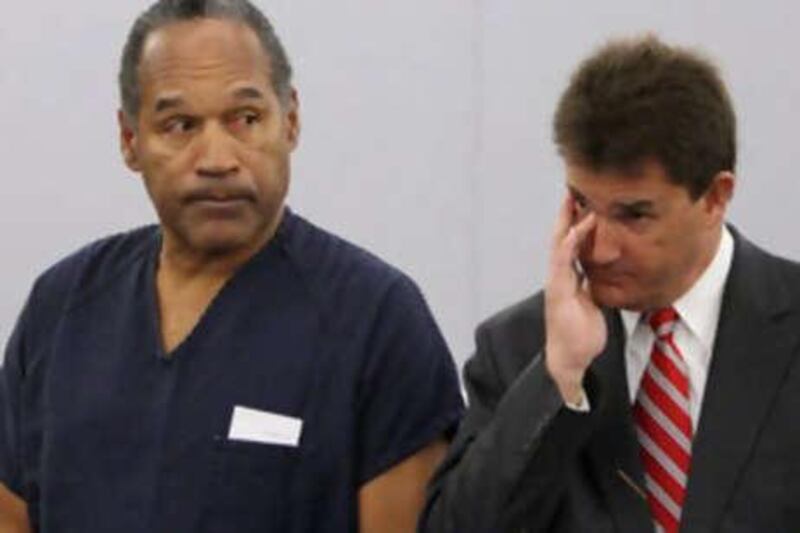LOS ANGELES // Thirteen years ago, OJ Simpson walked out of a Los Angeles courtroom a free man after the most publicised murder trial of the modern era. Yesterday, he was not so lucky. The one-time American football superstar was sentenced to at least 16 years behind bars for his role in a botched armed robbery on a pair of sports memorabilia dealers in a Las Vegas hotel.
Simpson took the news calmly, if not happily. Wearing blue prison fatigues - a far cry from the designer suits he wore when surrounded by his dream team of defence lawyers during the 1990s murder trial - he made an unusual address to the court shortly before sentencing, saying he felt both apologetic and confused. "I was stupid. I'm sorry," he said. "I didn't mean to hurt anybody and I didn't mean to steal from anybody ? I didn't know I was doing anything illegal. I thought I was confronting friends. I thought I was retrieving my things."
Simpson led a group of six men brandishing guns into a room at the Palace Station casino hotel in Las Vegas in September last year in an effort to recover sports memorabilia he felt were his. The episode was secretly recorded by the man who set up the meeting, a one-time friend of Simpson's called Thomas Riccio who later sold the tape to the media for US$120,000 (Dh440,000). The recording, in turn, made the prosecution's task relatively straightforward. Four of the six men agreed to testify against Simpson and another defendant, Clarence Stewart. The tape, in turn, became the centrepiece of the evidence presented to the jury - including one particularly damning line uttered by Simpson: "Don't let nobody out of this room."
As she handed down the sentence, Judge Jackie Glass said this was as close as it gets to an open and shut case. "Everything in this case was on tape," she said. "And it's your own words, Mr Simpson, you own words ? that brought you here to this seat in my courtroom. "You went to the room. You took guns. You used force. You took property, and in this state, that amounts to robbery with the use of a deadly weapon."
She went on: "Earlier in this case, at a bail hearing, I said to Mr Simpson I didn't know if he was arrogant, ignorant or both. During the trial and through this proceeding I got the answer, and it was both." Both Simpson and Stewart have announced they intend to appeal, but legal experts do not fancy their chances. Simpson's lawyers said their appeal would be on the grounds that the jury was manipulated to ensure no black people were chosen and that Judge Glass showed bias with theatrical behaviour, that included berating the defence legal team and sighing and waving her hands in apparent disgust.
Simpson, meanwhile, will start his sentence immediately and will not be eligible for a parole hearing for seven and a half years. To Simpson's enemies, the sentencing was a long-delayed vindication, condemning him to a life in prison they feel should have already been his following the brutal murders of his ex-wife Nicole and her boyfriend, Ronald Goldman, in 1994. "What we have is satisfaction that this monster is where he belongs - behind bars," Goldman's father Fred told reporters outside the courtroom. "If our efforts for all these years of pushing him drove him to commit armed robbery in Vegas, great."
To Simpson's dwindling band of supporters, yesterday's ruling by the Las Vegas Superior Court marked the latest inglorious chapter in a long fall from grace. Thirty years ago, he was a sports hero and a pop culture icon - a football superstar known as The Juice, and an occasional actor in Hollywood blockbusters such as The Towering Inferno and in The Naked Gun series of spoof disaster movies. In 1992, he divorced his second wife Nicole Brown with whom he had two children. The couple had separated three years earlier after Simpson pleaded no contest to a charge of domestic violence.
After the murders of Brown and Goldman, Simpson became the vehicle for a new generation of cable news stations and other media outlets who feasted on the sensation and endless gossip generated by his attempted getaway in a white Ford Bronco on the Los Angeles freeways, his arrest and his seemingly endless trial. White Americans were convinced he was guilty. Black Americans felt more solidarity because of the colour of his skin, and became outraged as the trial exposed one misstep after another by the Los Angeles Police Department.
His acquittal in October 1995 was a jolt felt around the world, and deeply divided Americans along racial lines. For the past 13 years he has lived more or less as a pariah. When he was ordered to pay US$33 million (Dh121m) to the bereaved families in the wake of a civil suit finding him liable for the murders, he moved to Florida and worked hard to shield his assets from them. Two years ago he came out with an odd almost-confessional book entitled If I Did It, which caused a furore of its own and ended at least one prominent career within Rupert Murdoch's publishing empire.
The Las Vegas robbery seemed, from the start, an almost willfully self-destructive act - or just possibly, the work of a man who came to believe he could do no wrong. The police were on his tail immediately, but Simpson seemed unconcerned, sipping cocktails by the pool of the Palms hotel in the hours before his arrest, telling one reporter: "I'm OJ Simpson. How am I going to think that I'm going to rob somebody and get away with it?" The answer, of course, is that he couldn't get away with it. And so, a long tawdry chapter in American pop culture draws to a close.
* The National






